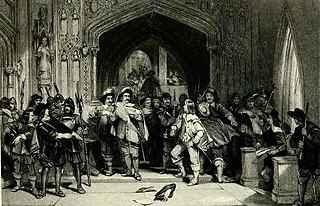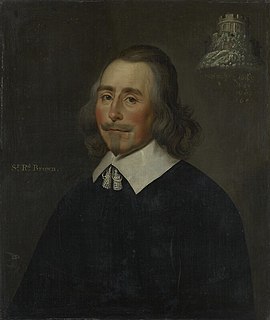Samuel Gardner was an English politician who sat in the House of Commons from 1645 to 1648.

The House of Commons of England was the lower house of the Parliament of England from its development in the 14th century to the union of England and Scotland in 1707, when it was replaced by the House of Commons of Great Britain. In 1801, with the union of Great Britain and Ireland, that house was in turn replaced by the House of Commons of the United Kingdom.
Gardner was the son or a kinsman of Philip Gardner who was mayor of Evesham in 1618. He was mayor of Evesham himself in 1625, 1633 and 1642. He was a wealthy man and on 16 January 1643 lent £1,000 without interest to Lord Brooke, the parliamentary commander. However he had considerable difficulty having the money repaid according to a series of parliamentary entries between April 1643 and May 1648. In 1645, he was elected Member of Parliament for Evesham until he was secluded under Pride's Purge in 1648. He was mayor of Evesham again in 1653. He was Lord of the Manor of Bewdley where courts were held in his name between 1670 and 1673, but he sold his title in the manor in 1674. . [1]

Evesham is a market town and parish in the Wychavon district of Worcestershire, southern England with a population of 23,576, according to the 2011 census. It is located roughly equidistant between Worcester, Cheltenham and Stratford-upon-Avon. It lies within the Vale of Evesham, an area comprising the flood plain of the River Avon, which has been renowned for market gardening. The town centre, situated within a meander of the river, is regularly subject to flooding. The 2007 floods were the most severe in recorded history.
Evesham was a parliamentary constituency in Worcestershire which was represented in the British House of Commons. Originally a parliamentary borough consisting of the town of Evesham, it was first represented in 1295. After this its franchise lapsed for several centuries, but it then returned two Members of Parliament (MPs) from 1604 until 1868, when its representation was reduced to one member under the Representation of the People Act 1867.

Pride's Purge was an event that took place in December 1648, during the Second English Civil War, when troops of the New Model Army under the command of Colonel Thomas Pride forcibly removed from the Long Parliament all those who were not supporters of the Grandees in the New Model Army and the Independents. Some have called it a coup d'état.





